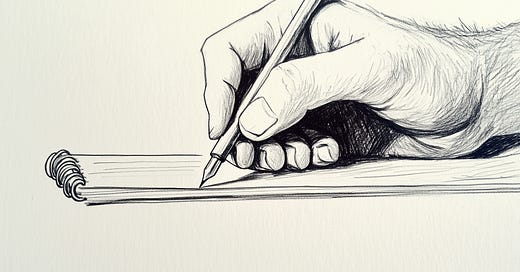Keep Doing It Yourself
With AI, productivity has never been easier—but are we losing something important along the way?
Thanks to AI, we’re doing fewer and fewer things ourselves. And we’re realizing that many of those things weren’t that fun to begin with. Emails? Tedious. Writing code? Antiquated. Planning a vacation? Stressful. Homework? Pfffft. Thinking? Hanging by a thread. Life as we knew it feels like a distant memory—and this is only the beginning.
The speed at which AI capabilities improve daunts even the most tech-forward minds. New versions, new capabilities, new models, and new use cases find their way into our lives every month. Just recently, DeepSeek flipped the AI world on its head when it demonstrated performance none thought possible with minimal financing and hardware.
There are specialized AIs for every use case imaginable. ChatGPT, Claude, Grok, and Gemini for research and content generation. Midjourney, Stable Diffusion, and DALL-E for images. Runway, Sora, and Synthesia for video. Cursor and Copilot for coding. Descript, ElevenLabs, Suno, Drift, Murf—and hundreds more apps for managing every corner of human output. AI is like the bed bugs of modern tech—once it finds its way into a dwelling, it takes over.
As a creator, I greatly benefit from this new world. I’ve created short films, artworks, and web applications on my own—projects that once required entire teams and thousands of dollars. And I understand the moral and ethical questions people raise about living in such a world—though I find many of those concerns to be overblown.
We can't help but wonder, often fearfully, where this all leads. Is there a limit to what we can automate? What is the future of work? Of living? Of meaning?
Unfortunately, I can’t answer these questions (though I’m sure ChatGPT has plenty to say on the matter). The question I want to answer is not what we can automate, but rather what should we automate? Not on a societal level—that we cannot control—but on a personal level.
With all the positives AI has brought me, I also find myself assigning it things I enjoy. Take writing, for example. I’ve loved writing since high school. And while I’ve always felt like I haven’t done enough of it—and that what I do could be better—I’ve always approached it as a craft. In the past, I spent hours perfecting a single paragraph—pondering the most poignant pairing of words or shaping an important idea just right. But now, wordsmithing has been replaced by promptsmithing, a far less wondrous experience. I’ve grown accustomed to just asking AI to write things for me (I promise this post is not one of them).
To be fair, just because I enjoy writing doesn’t mean I need to write every word I need to communicate. Not all writing is equal, after all. But that’s one of the problems of AI—a helping hand can quickly become a crutch. And lean on a crutch too long, and you might forget how to walk.
Yes, AI is powering the productivity revolution. And even the creative revolution. And there will be many more capabilities AI develops in the years ahead. But, like with other groundbreaking technologies (looking at you, smartphones and social media), there will come a tipping point where the novelty wears off—and it becomes yet another system that dictates our attention and pulls us away from the things we used to love.
So the challenge we all face is learning to use this paradigm-shifting technology mindfully and with purpose. How do we ensure it enhances our lives instead of erasing the parts we love? Can we avoid a dystopian future where the only purpose of AI automation is to allow more of our attention to be sucked away by other big tech enterprises? This will be the next great techno-struggle in our ever-changing reality.
The real danger isn’t AI itself—it’s what we mindlessly let it replace. The challenge ahead isn’t just about what AI can do. It's about what we refuse to let it take away.



